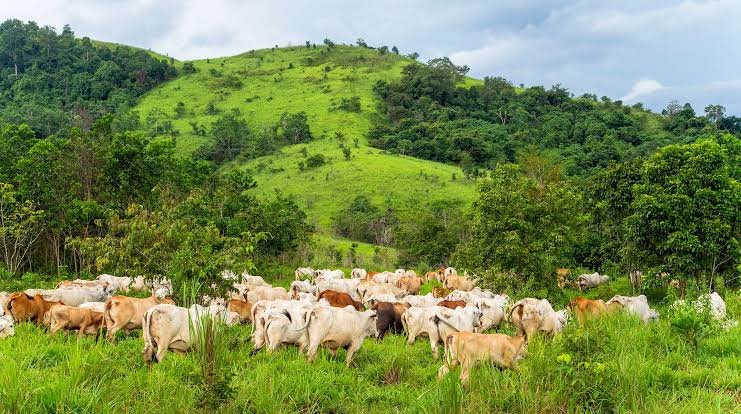By Philip Yatai/Amen Gajira
Farmers in Manchok community of Kaura Local Government Area in Kaduna State are counting their losses after cows destroyed their crops valued at millions of naira.
The visibly distraught farmers told the News Agency of Nigeria (NAN) in Manchok on Saturday that the destruction had predisposed them to hunger.
“Aside from hunger that is clearly imminent, I have lost my investment,” one of them, Mrs Martina David, a mother of four, told NAN.
“I invested about N1.3 million in sweet potato farming but everything was destroyed in two days by the cows whose owners are unknown to us,” she said.
The housewife said that the money was a loan facility she collected because of the potential for huge return on investment.
She explained that she cultivated 188 ridges of potato in about four hectares of land and expected to harvest about 752 bags at three to four bags per ridge.
She estimated a return on investment of about N12.78 million at the current price of between N17,000 to N20,000 per bag.
“Sadly, my hope has evaporated; when I visited my farm and discovered that more than half of it was destroyed by cattle, my feet couldn’t hold me.
“In tears, I fell on my knees and cried, wondering how I am going to come out of this predicament.
“I pulled myself together, wiped my tears and created some barriers to protect what was left.
“To my surprise, when I returned the following day, the entire potato plant had been wiped out by cattle. I didn’t get a thing from my investment,” she said.
She appealed for help from just anyone.
“I don’t know how I will repay the loan I collected because my husband, a farmer, is sick and could not cultivate anything this year,” she fumed.
Another victim, Mr Ibrahim Yashim, said that he planted guinea corn in four hectares of land.
“I was full of hope and was looking forward to a bumper harvest but herders invaded the farm with their cattle and destroyed about three hectares,” the primary school teacher told NAN.
He said the farm cost him N730,000, covering cultivation, inputs and labour.
“I was expecting to harvest at least 40 bags of guinea corn at 10 bags per hectare.
“The return on investment would have amounted to more than N4.8 million at the current market price of between N110,000 and N120,000 per bag.
“But as I talk to you, only about a hectare is left; the remaining three hectares were destroyed by the cattle.
“I got home from work and my mother asked me to go and check the farm; she said someone told her that cows entered my farm.
“On getting there, I was horrified by what I saw. About half of the crops were destroyed by cattle. I just sat down on the ground because my legs couldn’t hold me,” he said.
He said that he complained to the leader of the Fulani community in Manchok, Mr Salisu Ibrahim, popularly called Ardo.
“Unfortunately for me, the Ardo said there is nothing he could do except if the herder is caught.
“Unfortunately for me, the cattle continued the destruction and scattered about three hectares of the farm,” he fumed.
Reacting, Mr La’ah Philemon, National Leader, Youth Wing of the Moro’a Development Association, told NAN that so far, about 39 farms had been destroyed by rampaging herders.
Philemon, who expressed concern over what he described as a “looming hunger” in Moro’a land, called for a ban on open grazing during the rainy season.
“This will tackle the wanton destruction of crops and promote peace between farmers and the herders.
“As you have seen, most of the victims are in a dilemma. The rainy season is almost over, we can’t re-cultivate and replant.”
He recalled that the continued destruction of crops by herders recently led to a confrontation that left one person dead while three others were injured.
The youth leader called on government at all levels and other organisations to come to the aid of the victims to enable them to feed their families and survive the current hardship.
Confirming the incidents, the District Head of Manchok, Mr Ishaya Tabat, said that the traditional council had intervened toward finding a lasting solution to the problem.
Tabat said that several meetings had been held with the leaders of the Fulani and herders in the community, adding that the herders had agreed to compensate the famers.
When contacted, the Ardo acknowledged that the dialogue between the Fulani and the community leaders had been “fruitful”.
He assured the farmers that the compensation would be paid “very soon”.
On efforts to prevent a recurrence, the leader said that most of the perpetrators of the acts were herders who came into the community from different locations.
He added that with the help of security agencies, the “strangers” had been successfully pushed out of Manchok.
“We have successfully pushed the destructive cattle and their owners to wherever they came from. All we want now is continued support for the peace building process in the area,” he said.
NAN
